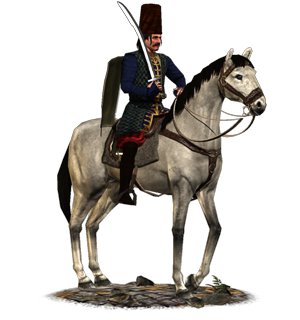Difference between revisions of "Wallachian Boyars (ETW Unit)"
(Created page with "These swift light horsemen are right to see themselves as better men than their foes, as they pursue enemies from the battlefield. {{Unit|image=Image:Wallachian_boyar.jpg| ...") |
(→Factions) |
||
| Line 24: | Line 24: | ||
==Factions== | ==Factions== | ||
| − | *[[Image:Ottoman_flag.jpg|25px]] [[ | + | *[[Image:Ottoman_flag.jpg|25px]] [[Ottoman Empire (ETW Faction) | Ottoman Empire]] |
[[Category:Heavy Cavalry]] | [[Category:Heavy Cavalry]] | ||
Revision as of 09:14, 9 January 2011
These swift light horsemen are right to see themselves as better men than their foes, as they pursue enemies from the battlefield.
Overview
Wallachian boyars carry sabres but do not wear armour. This aids them in moving quickly across broken ground but makes them vulnerable when in combat against heavy cavalrymen. It would be wasteful to use boyars attacking formed infantry in square, but they are extremely useful in pursuing already-broken enemies. They can also be used to ride down disorganised troops and skirmishers.
Wallachia had been a battleground for over a century, as both the Austrians and the Russians attempted to take the province from the Ottomans during a series of wars. The boyar aristocracy were not, however, always impressed with their new rulers and their absolutist ways: they had often enjoyed more latitude under the Ottomans. Being a boyar was a mark of nobility, and meant that a boyar man owned land, had serfs, and had military duties or obligations. The boyars had begun as elected chiefs but had, over the centuries, become a hereditary class; this meant a man could be "of boyar bones" and aristocratic even if he lacked lands or serfs to work it. As in many other parts of Europe, military service was an honourable, possibly the only, profession for a nobleman.
